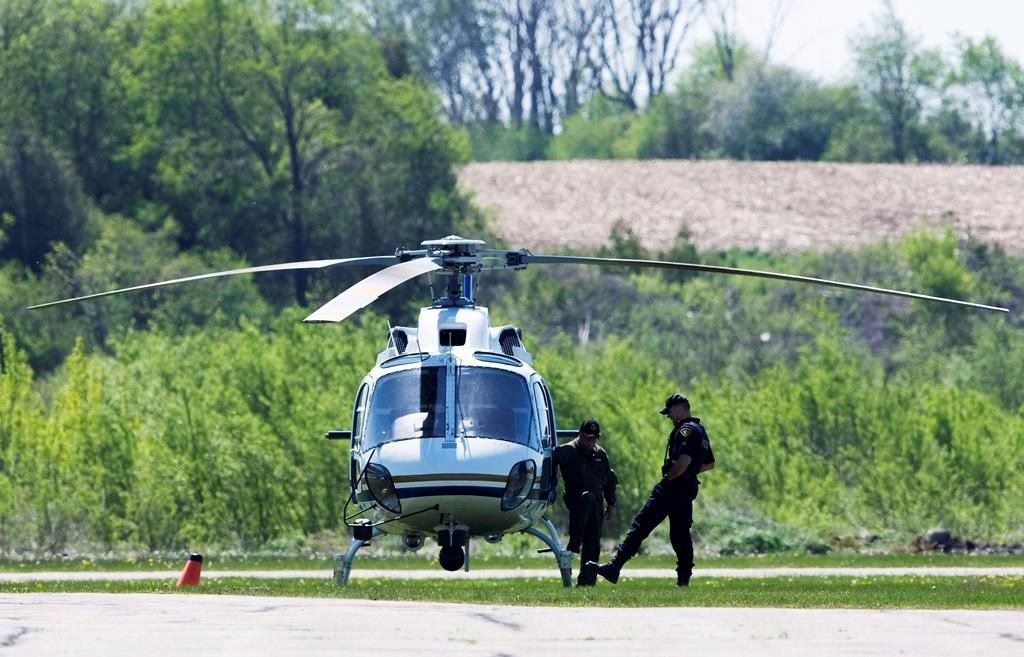The province and Toronto-area police forces state that four new police helicopters will aid in addressing the car-theft crisis and in finding missing vulnerable people.
Toronto, Peel Regional, Halton Regional, and Durham Regional police services joined forces to request more air support for the region. Currently, two forces in the area each share a helicopter with other police forces as needed and based on timing.
The Ontario Provincial Police will purchase four helicopters at a cost of about $36 million, with the province allocating $10 million to operate them over the next three years, according to Solicitor General Michael Kerzner.
It has not been determined whether the OPP will operate the helicopters on behalf of the four police forces or lease them out to those services.
The Ontario Provincial Police described the unprecedented rise in car thefts across the province in recent years, driven by the demand for high-end vehicles that are shipped to Africa and Europe. Nearly 3,000 cars were stolen in the province over the past seven weeks, the force reported.
The majority of Ontario's stolen vehicles are either driven or transported to Montreal and then taken out of the country through the Quebec city's port, the province stated.
Kerzner stated that as criminals become more sophisticated, law enforcement will also evolve. The government's stance is clear – with helicopters, they can locate criminals on the highways and respond.
Further details on how the helicopters will operate will be provided in due course, Kerzner mentioned, without committing to a specific date for the new helicopters to be airborne.
The purchase was outlined in the provincial budget released last week, with few specifics provided. The four new helicopters will be added to the lone helicopter in Durham, east of Toronto. Nearby York Regional Police also has its own helicopter, while the OPP already have two.
Durham Regional police has possessed its helicopter, Air1, for 25 years.
Deputy Chief Chris Kirkpatrick mentioned that the police helicopter has saved lives over the past twenty-five years and can reach any location within its 2,500-square kilometre jurisdiction within minutes.
Air1, which can respond at any time of day or night, received 860 service calls last year. In 147 of those calls, the police helicopter located people, including those evading police or missing vulnerable individuals.
The helicopter is equipped with thermal imaging that makes it easier to find people hiding or those lost in remote areas.
The air unit is particularly effective at locating missing vulnerable individuals, especially the elderly with dementia who may wander away from home.
When dealing with cases of missing vulnerable individuals, time is crucial. The helicopter proves to be an invaluable asset in such situations, Kirkpatrick noted.
It has greatly assisted in promptly locating and ensuring the safety of these individuals, reuniting them with their families.
The aerial perspective also enhances safety for officers on the ground, Kirkpatrick added.
The speaker explained that having air support is like having someone watching over them from above, which allows them to see things from a different perspective and communicate the full picture to those on the ground.
The Toronto police, which hasn't had its own helicopter for many years, approves of the government's decision.
Chief Myron Demkiw stated that having access to helicopters will improve the way police respond to crimes across different areas, making it easier to track down and catch criminals involved in violent offenses like home invasions and carjackings.
The use of air support will improve the police's ability to handle rapidly changing and dangerous situations, and also aid in searching for missing vulnerable individuals.
Ontario's New Democrat Leader Marit Stiles criticized the government's decision, suggesting that they should focus on addressing the overwhelmed court system instead of investing in helicopters.
Marit Stiles expressed the need to focus on preventing car thefts rather than just chasing after stolen cars, highlighting the importance of proactive measures.
With Ontario's jails overcrowded, Green Party of Ontario Leader Mike Schreiner argued that the money allocated for helicopters could be used more effectively elsewhere.
Mike Schreiner pointed out that the majority of people in provincial jails are awaiting trial, emphasizing the significant backlog in the system.
According to Mike Schreiner, instead of addressing the backlog in the court system, the government's decision to invest in helicopters reflects a misplacement of their priorities.



